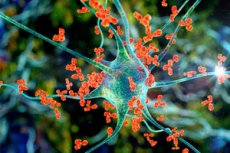
一种新的先进人工智能 (AI) 算法有望更准确、更早地预测自身免疫性疾病,并带来新的治疗方法。自身免疫性疾病是指免疫系统错误地攻击人体自身的健康细胞和组织。该算法分析这些疾病背后的遗传密码,以更准确地模拟与特定自身免疫性疾病相关的基因的表达和调控方式,并识别其他风险基因。
这项研究由宾夕法尼亚大学医学院的一组研究人员开发,其结果优于现有方法,并识别出26%以上的新基因-性状关联。他们的研究成果今天发表在《自然通讯》杂志上。
“我们每个人的DNA中都存在突变,我们需要了解这些突变如何影响疾病相关基因的表达,以便我们能够及早预测疾病风险。这对于自身免疫性疾病尤其重要,”宾夕法尼亚大学医学院杰出教授、研究副主席、人工智能与生物医学信息学主任、该研究的共同作者刘大江说道。
“如果人工智能算法能够更准确地预测疾病风险,就意味着我们可以更早地进行干预。”
遗传学和疾病的发展
遗传学通常是疾病发展的基础。DNA变异会影响基因表达,即DNA中的信息转化为蛋白质等功能性产物的过程。基因表达的强弱会影响患病风险。
全基因组关联研究(GWAS)是人类遗传学研究中一种流行的方法,它可以识别与特定疾病或性状相关的基因组区域,但无法精确定位影响疾病风险的具体基因。这就像与朋友分享你的位置,但无需在智能手机上进行微调——城市信息可能显而易见,但地址信息却隐藏了。
当前的方法在分析细节方面也受到限制。基因表达可能特定于某些细胞类型。如果分析不能区分不同的细胞类型,结果可能会忽略遗传变异与基因表达之间真正的因果关系。
EXPRESSO 方法
该团队的方法称为 EXPRESSO(仅使用汇总统计数据的表达预测),使用更先进的人工智能算法,并分析将遗传变异与其调控的基因联系起来的单核细胞定量表达特征的数据。
它还整合了3D基因组数据和表观遗传学,用于测量基因如何被环境修改并进而影响疾病。该团队将EXPRESSO应用于14种自身免疫性疾病的GWAS数据集,包括狼疮、克罗恩病、溃疡性结肠炎和类风湿性关节炎。
宾夕法尼亚大学医学院助理教授、该研究的资深作者江碧波说:“通过这种新方法,我们能够识别出更多真正具有细胞类型特异性影响的自身免疫性疾病风险基因,这意味着它们只影响某一类型的细胞,而不会影响其他类型的细胞。”
潜在的治疗应用
研究团队利用这些信息寻找自身免疫性疾病的潜在治疗方法。他们表示,目前尚无有效的长期治疗方案。
“大多数治疗旨在缓解症状,而非治愈疾病。这是一个两难的境地,因为自身免疫性疾病需要长期治疗,但现有的治疗方法往往副作用严重,无法长期使用。然而,基因组学和人工智能为开发新的疗法提供了一条充满希望的途径,”宾夕法尼亚大学医学院生物化学和分子生物学教授、该研究的共同作者劳拉·卡雷尔说道。
该团队的研究发现了能够逆转自身免疫性疾病相关细胞类型基因表达的药物化合物,例如用于治疗溃疡性结肠炎的维生素K,以及用于治疗1型糖尿病的常用药物二甲双胍。这些药物已被美国食品药品监督管理局(FDA)批准,被认为安全有效地用于治疗其他疾病,因此有可能被重新利用。
研究团队正在与同事合作,在实验室中测试他们的研究成果,并最终在临床试验中测试。
这项研究由生物统计学博士生 Lida Wang 和 Chakrit Khunsriraksakul 领导,Khunsriraksakul 将于 2022 年获得宾夕法尼亚大学生物信息学和基因组学博士学位,并于今年 5 月获得医学学位。宾夕法尼亚大学医学院的其他作者包括正在攻读博士学位和医学学位的 Havell Marcus、博士后研究员 Deyi Chen、研究生 Fang Zhang 和博士后研究员 Fang Chen。德克萨斯大学西南医学中心助理教授 Xiaowei Zhang 也参与了这项研究。

